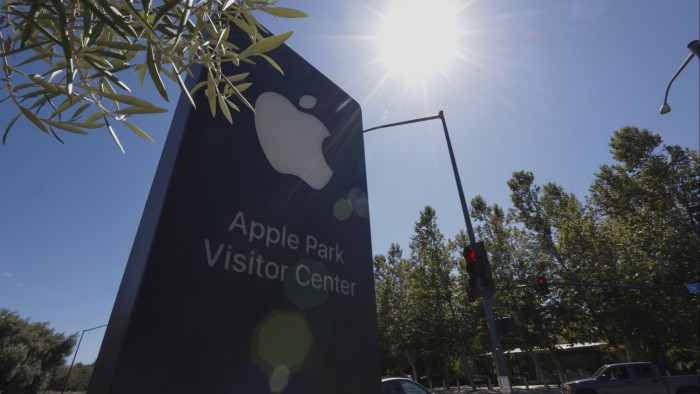Unlock the Editor’s Digest for free
Roula Khalaf, Editor of the FT, selects her favourite stories in this weekly newsletter.
Apple’s late leader Steve Jobs was known for having unusual habits — soaking his feet in the toilet during times of stress, for instance. His successor Tim Cook is more conventional, as bosses go. But as Silicon Valley embraces new business models, he and Apple too look like outliers.
The differences aren’t all flattering. Among the “Magnificent 7” stocks, the iPhone maker has performed worse in 2025 than all but Tesla, falling 15 per cent. While executives at other tech giants wax lyrical about their artificial intelligence-powered prospects, Apple’s quarterly earnings on Thursday reflected a future defined by more prosaic topics.
Tariffs are chief among them. Levies on India and Vietnam force Apple to absorb, or pass on, cost increases for products sold in the US, the majority of which come from those countries. Tariffs will shave $1.1bn off gross profit in the current quarter, it estimates, though those numbers seem to reflect current levies rather than higher ones that may soon come.
Then there are Apple’s legal challenges. Various industry antitrust assaults threaten the revenue it receives for pre-installing Google apps on its phones, and the fees it skims off purchases in its app stores. Those uncertainties took the lustre off what was otherwise a solid quarter, in which revenue grew 10 per cent year-on-year.
On some counts, Apple resembles its peers more than it used to, thanks to Cook’s efforts. Services, such as payment fees and television streaming, were once dwarfed by its sales of devices but now contribute 29 per cent of revenue.
Instead, Apple is becoming a contrarian bet in a different sense: by all but sitting out the AI investment frenzy. As Alphabet and Meta Platforms plaster the map with data centres and chase AI “superintelligence”, Apple’s spending remains modest. Its $49bn of fixed assets compares with $203bn at Google parent Alphabet, and $147bn at Facebook owner Meta. Five years ago, there was much less space between them.
Pressure to conform is growing. Cook says Apple will “significantly” expand its investment, though doesn’t say by how much. But the numbers are likely to remain small. Analysts expect $11bn of capital expenditure next year — a tenth of what Meta and Microsoft have planned. Apple is thus not a bad bet for investors who fear the AI infrastructure boom will end in tears.
Of course, Cook could decide to be nonconformist in another way, and buy what others are building. With $31bn of net cash and a $3.1tn market capitalisation, few targets would be financially out of Apple’s reach. France’s Mistral AI is one that has been mooted.
That would be a real break from the norm. Apple has bought seven companies this year so far, Cook told analysts on Thursday, all of them small. That checks out: mega-sized mergers have never been Apple’s style. But if the fear of missing out becomes too much, the next trend Cook bucks might be his own.
[email protected]
